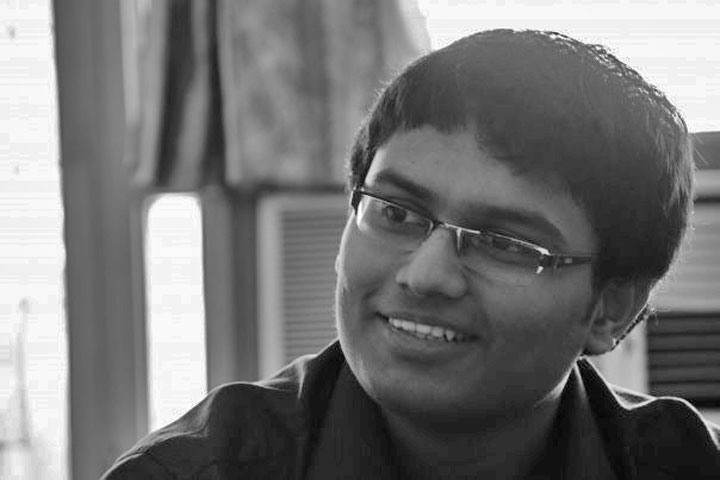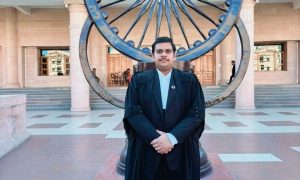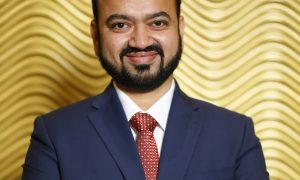Prashanth Potluri is a graduate of 2011 batch from School of Law, Christ University. He has been a LAMP fellow and till recently he worked as a Senior Specialist in Public Affairs and Advocacy at Genesis Burson-Marsteller. He is famous among his colleagues as a passionate footballer and most amazingly he could take time out from a busy schedule for football as a law student and even after joining work. In this interview he talks about:
- Taking time out for football from a busy schedule
- Working as a legislative and research assistant for HRD Ministry and being a LAMP fellow
- A career in Policy
- Work experience at Genesis Burston-Marsteller and ThoughtWorks
Given that most of our readers are law students and young lawyers, how will you introduce yourself to them?
I am a graduate from the 2006 – 2011 batch of the School of Law, Christ University (SLCU), Bangalore. I went on to pursue the LAMP fellowship after graduating, shortly after which I completed a course in Leadership Development at the Indian School of Business, Hyderabad. I am an avid football fan and the game of football has been my biggest teacher. I have always been very clear since my initial days at law school, that I would want to make a career in a field that isn’t directly related to the law and the two things that I have always loved were football and politics.
Amongst the various career options, what motivated you to choose law?
Frankly speaking, I didn’t have too many options. I was a mediocre student in school and I was in the commerce stream. I only did well for myself in the Social Sciences. This gave me an indication as to where my interests lie. I have been fascinated with politics since a young age and a law degree felt like a useful tool for me to have to pursue a career in politics and its allied fields such as policy studies, public affairs and administration etc. I have never wanted to be a lawyer during my time at law school and after graduating either. I chose law as a means to my political ends and also because I knew it would enhance my ability to think in a different and more holistic manner.
How was your law school experience? What did you do to keep the monotony off the law school?
I had a very rough start to my law school experience. I was frustrated that I did not get into any of the top 3 national law schools, which I believed I deserved at that time I made up my mind that I would take the entrance exams the second time. Having failed to get through the top 3 schools again, I realized that I would spend the next 5 years here and that’s when I decided to embrace my fate. In retrospect, it’s the best thing I have done because, I ended up having the best 5 years of my life from 2006-2011 and I had the fortune of meeting some of the best people there and building relationships that I know will last a lifetime. I realized that a law school experience is only as good as the people you are surrounded by and we had some very intelligent and fun-loving people at SLCU. I made sure I took part in quite a few extracurricular activities such as football, quizzes, debates and music and this made sure my mind was active and constantly challenged and there was no room for monotony. I was never much of a mooter and the few times I did moot, it was because I had no other choice or because a friend’s team could have used a researcher. If I sensed any kind of monotony kicking in, I would make sure I start doing something new and fun to keep me entertained and living in a fantastic city like Bangalore definitely helped my cause!
How did you manage time to pursue your passion for football while pursuing a law course?
I made it very evident to my family, faculty and peers that football was, is and always will be my first love and passion and I wouldn’t treat it as an ‘extra activity’. This didn’t go down too well with my faculty and college staff, but this was a decision that I was entitled to make. The manner in which I managed football and the pressures of a law school was not done in the best way possible, but I managed nonetheless. The classroom chatter included football talk, match analysis and sometimes even sneaking in the occasional YouTube clips during class hours. Once the exam dates were announced, I’d go back to my books and ensure I put in enough hours to get good score. I never missed a football game even during exam time though. In the words of a very wise boy (Calvin), last minute panic served as the best kind of motivation to make sure I did well for myself academically in law school.
Do you still play for or manage football clubs? Please share some tips on time management.
I don’t play football as often as I would like (everyday) due to commitments at work, but I make sure I play once a week. I was recently offered a trial with Histon F.C., an English club that play at the Ryman Premier Level and I have decided not to pursue that as it didn’t seem pragmatic in many ways. I currently don’t manage any teams although I did so for 5 years at law school with the college team and this experience has taught me critical life skills such as leadership, managing people, identifying talent and nurturing it, managing deadlines etc. and I am truly grateful for that experience. I couldn’t have managed a football team so well without the efforts of the team itself. We were a self managing unit of sorts and I was just leading the way, but on a day to day basis, everyone did what they were expected to. I clearly laid out the expectations I had from them and they always delivered. Everybody played a critical role in making sure there was a sense of camaraderie and family in the team. This ensured on-the-field success and off-the-field friendships. My tip on time management would be to have a clear agenda for your day, allocate specific time for each activity and make sure you are well rested so as to be physically capable of doing what you have planned. Sound sleep, nourishment and clarity of thought in managing your time is very important.
You worked as a Legislative and Research Assistant for the HRD Ministry in your fifth year. How did this happen? What was the application procedure?
This was a classic case of being at the right place at the right time. I had not formally applied to it and there was no opening per se. I was very interested in education and public policy at that time and thought it would be a good idea to work at the HRD ministry. I later met a family friend who helped me get the opportunity to work in the ministry.
You became a LAMP fellow just after graduation. What are the criteria to apply? How did you go about your application process?
The LAMP fellowship requires you to be a graduate and within 25 years of age, – from a relevant academic background and expects you to commit yourself for a period of one year. I received an e-mail regarding this fellowship through the college and I looked it up, it was very compatible and accurate with regards to what I wanted to do in my career, which was politics. The LAMP fellowship was a very tangible step I took to ensure I built myself a career in politics and public policy.
What was your work profile as a LAMP fellow? How did it help build your career in Policy?
I worked with Mr. Tiruchi Siva from the DMK who was a Rajya Sabha MP and the Chairman of the Parliamentary Standing Committee on Industry and a Member of the Joint Parliamentary Committee on the 2G Spectrum Allocation.My daily tasks consisted of intensive research that facilitated his day to day parliamentary duties and ensure that he was well equipped for his parliamentary debates, standing committee meetings etc with the best possible research.
Working closely with an MP gives you the kind of insight into policy making that no other job does. You get to witness a policy from an idea to an actual policy that gets implemented. This is very useful in pursuing a career in public policy in the long run.
We often hear that more lawyers are getting into ‘policy work’. What does this actually involve? What is it that policy lawyers do?
Public Policy professionals are a bit different from lawyers with regards to what they do on a daily basis. Policy work relates to the study, understanding, drafting and interpreting of rules pertaining to a very specific subject unlike a statute/legislation which is meant for a broader and more generic set of circumstances. This is why lawyers do well for themselves in this field. Every organization has a set of internal policies, every ministry in the government have a set of internal policies that facilitate the working of the larger statutes that come under their purview and lawyers are equipped with a foresight and thought process that lets them know what a comprehensive policy should entail, better than people from other academic backgrounds. Public policy professionals spend a lot of time researching on policies of other countries and organizations and get a comprehensive understanding on what the most suitable policy would be for their specific need. It does have a lot of overlapping with what lawyers do which is why lawyers are most preferred in this field. We get to research, draft and interpret policies on a gamete of issues minus the task of going to courts and presenting our case. We let the lawyers do that for us 🙂
You also worked with Genesis Burson-Marsteller. What was your job profile there? What was a normal workday like?
I worked as a Senior Specialist in Public Affairs and Advocacy at Genesis Burson-Marsteller and I was based at Delhi/Gurgaon. It was the best experience I had as a working professional dealing with a variety of corporate and political clients. Normal work days varied depending on whether I was working on a corporate or political client. With regards to corporate clients, my job entailed me to map out a comprehensive list of stakeholders, profile them and prepare an outreach and advocacy strategy for the clients. We also had meetings and calls with our clients which ensured we constantly had something to do. Political clients were a completely different ball game and this was the part of my job that I cherished the most. I got to work on a few election campaigns including the recently concluded general elections and my tasks included constant research on various talking points, drafting speeches, articles, talking points for the client, undertaking surveys to assess how much we have progressed, prepare a comprehensive strategy on how to best utilize the resources in hand etc.
You completed a course from Indian School of Business on Leadership Development. Please tell us a little about it. How did you decide to take it up? How effective was the course for your career?
The leadership development course at ISB was a part of our LAMP fellowship. PRS, the organization that undertakes the LAMP fellowship tied up with ISB that year to undertake a course in Leadership Development so as to supplement and enhance the skill set we had already developed on the job. I had a fantastic time doing this course and it has definitely been a huge value addition with regards to my career options. It taught me to clearly articulate my thoughts and carefully execute a vision and motivate my colleagues during testing times which has proven to be very useful while working with different organizations.
You had worked with ThoughtWorks for some time. What was your job profile there?
It was a research centric job which taught me a lot on market research and fine tuned my ability to make and give presentations. It was not a conventional policy job but it was fun working there as it provided me with a lot of insight on various business verticals and business trends. I worked with some amazing people there and it gave me a more global perspective on a lot of issues and taught me how to manage expectations with the people I work with.
What would be your message to our readers who would want to take up a career in Policy?
To put it quite simply, do it. It is a very rewarding and viable career option for lawyers and non-lawyers alike. I hope law students stop looking at this as an ‘alternative career path’ and look at it as a conventional career choice in the future. From my experiences in this field I can vouch for the fact that it is a challenging area to work in and it requires a lot of dedication and an ability to think in a holistic manner with proper foresight. The ability to think and articulate yourself is very important in the field of public policy and its allied areas. There are tons of career options and if anyone is interested in taking it up, I would be glad to provide any kind of clarity they may require.
























